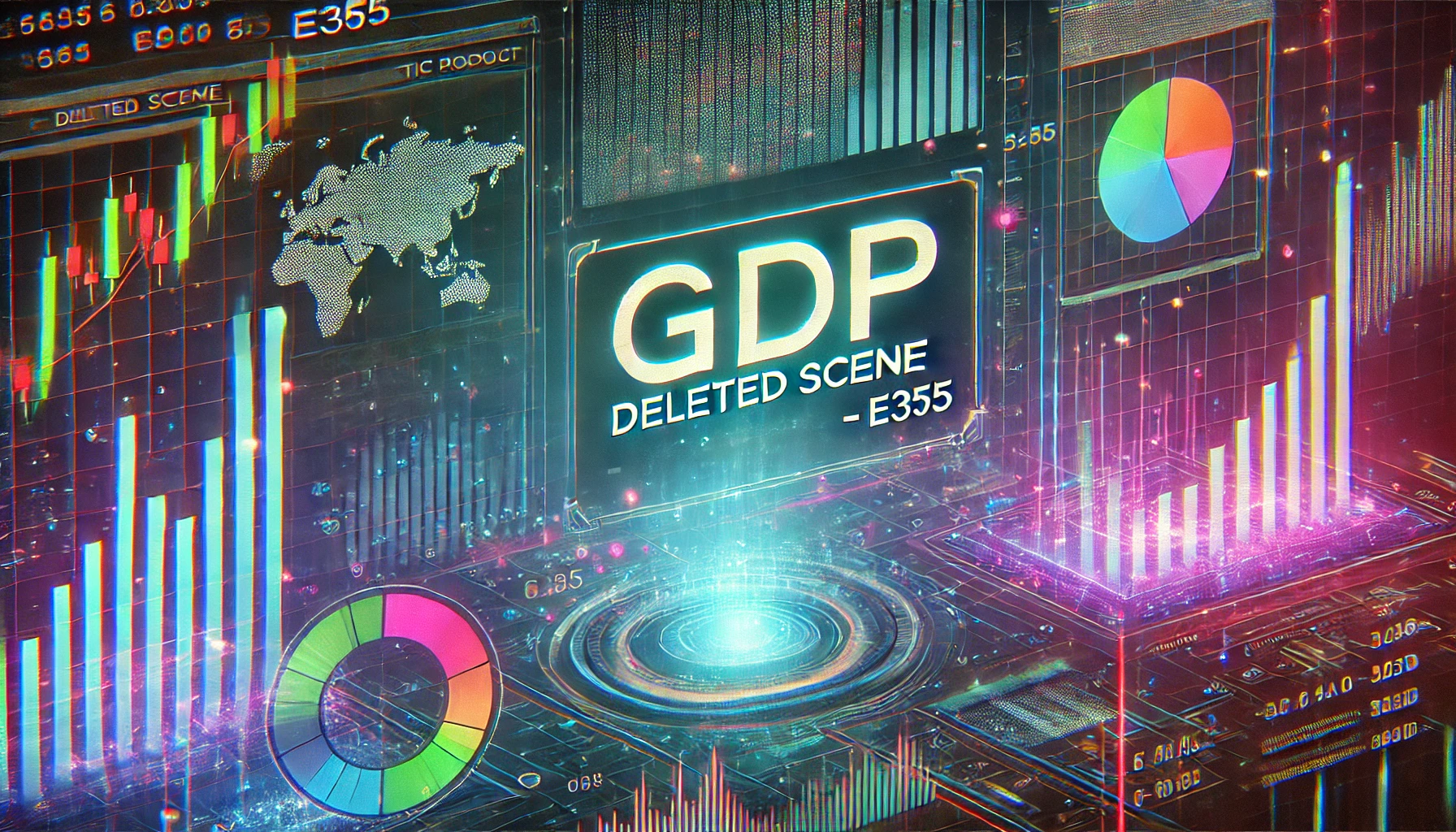In the grand narrative of economic discourse, the Gross Domestic Product (GDP) stands as one of the most pivotal metrics. It encapsulates the entirety of a nation’s economic health and activity, providing insight into the level of productivity, the standard of living, and even the nation’s political standing in a global context. However, much like any great story, the GDP often has unseen nuances, subtle shifts, and critical moments that go unnoticed in the general debate. Deleted Scene E355 is one such instance, a theoretical and significant moment within economic analysis that raises questions about what is omitted when we examine GDP through a traditional lens.
Scene E355 may sound like an enigmatic, almost cinematic moment in the study of economics, yet its implications are quite real. Understanding the economic ripples it causes helps to shine a light on the deeper components of what GDP truly reflects, what it hides, and why it’s important to rethink how we interpret it in global policymaking.
What is GDP?
To grasp the weight of Scene E355, it is first necessary to revisit the foundation of Gross Domestic Product (GDP). This universally accepted metric calculates the market value of all final goods and services produced within a country during a specific period. The formula itself is simple:
GDP = Consumption + Investment + Government Spending + (Exports – Imports)
However, the simplicity of the formula belies the complex economic relationships it encapsulates. Consumption, for instance, can reflect the disposable income of households, while investment might indicate business confidence. Government spending highlights the role of public investments in shaping the economy, and the balance of exports and imports shows the nation’s engagement with the global economy.
GDP is not without its controversies, though. Despite being a widely respected measure, it faces criticism for what it excludes. These exclusions form the core of what Deleted Scene E355 explores—omissions that can significantly skew how economies are perceived and how policies are designed.
Deleted Scene E355: The Unseen Gaps in GDP
While the term Deleted Scene E355 may sound fictional, it is a conceptual reference to the “hidden scenes” in GDP calculation. These hidden scenes represent important aspects of economic life that GDP overlooks, either because they are hard to measure or don’t fit neatly into its framework. So, what exactly does Scene E355 delete from our view of the economy?
One of the most critical elements deleted from the scene is informal economies. In many developing nations, a large portion of economic activity occurs outside the formal structures of recorded labor, businesses, and taxes. People engage in bartering, unregistered labor, and subsistence farming, none of which contribute directly to GDP. This omission can significantly underrepresent the true level of economic activity, leading to distorted views on poverty, unemployment, and national wealth.
Furthermore, non-market transactions such as household labor or volunteer work are also deleted from GDP considerations. Consider the hours spent by parents raising children or the unpaid caretakers looking after elderly relatives—these efforts are critical to the economy’s functioning, yet they don’t factor into GDP calculations.
Environmental degradation is another critical element deleted from the scene. When a nation experiences rapid industrialization or development, its GDP may skyrocket, but the hidden cost is often environmental harm. Yet, GDP does not subtract the cost of resource depletion, pollution, or long-term environmental damage from its figures. This presents a skewed picture of prosperity, one where economic growth might be celebrated at the cost of sustainable futures.
The Overemphasis on GDP Growth
Scene E355 also hints at a larger philosophical debate within economics—the overemphasis on GDP growth as the ultimate measure of success. Economies around the world chase ever-higher GDP figures, using them as a proxy for national well-being, social progress, and global competitiveness. Yet, an exclusive focus on GDP ignores critical factors such as income inequality, public health, and education—dimensions that are equally, if not more, important to the quality of life.
Countries like Bhutan have pioneered alternative metrics like Gross National Happiness (GNH), which takes a more holistic view of national progress, including factors like environmental sustainability, cultural preservation, and mental well-being. The fact that Scene E355 exists as a conceptual oversight in GDP calculations reflects the growing awareness that GDP growth alone does not equate to human flourishing.
How GDP Deleted Scene E355 Impacts Policy Making
The implications of Scene E355 are far-reaching, particularly when it comes to policy-making. Policymakers who rely solely on GDP to assess the success of their nations may inadvertently neglect critical aspects of economic health. For instance, in countries where a large percentage of the population works in the informal sector, failing to account for this labor can result in underinvestment in education, healthcare, and social services for these workers.
Social inequality is another issue obscured by Scene E355. GDP may be rising, yet that growth could be concentrated in the hands of a few. Without supplementary data on income distribution, the true economic well-being of the population remains hidden. This can lead to policies that benefit the wealthy while leaving the rest behind, further exacerbating social divides.
Similarly, GDP-driven policies often ignore environmental sustainability. Governments focused on boosting GDP may prioritize industrial expansion and resource extraction at the expense of environmental protection. This short-term economic gain can lead to long-term environmental disasters, a cost that GDP does not account for but will be paid by future generations.
The Role of Technology and Data in Illuminating Scene E355
In recent years, the rise of big data and artificial intelligence has opened new possibilities for addressing the gaps represented by Scene E355. By using more sophisticated data collection and analysis methods, economists can begin to include previously ignored factors such as informal economies, environmental costs, and social well-being into their assessments of economic performance.
For instance, satellite data can now track environmental degradation in real-time, providing more accurate measurements of a nation’s natural resource usage and pollution levels. Similarly, mobile technology can help governments better track the informal economy, allowing for more accurate assessments of total economic activity. These advances could allow for a more nuanced and complete picture of the economy, one that includes Scene E355 rather than deleting it from view.
A Call for New Metrics Beyond GDP
Ultimately, the exploration of Deleted Scene E355 invites a broader conversation about the need for new economic metrics. While GDP has served as a reliable indicator of economic activity for decades, it is increasingly clear that it cannot capture the full complexity of modern economies. Metrics such as Genuine Progress Indicator (GPI) or Human Development Index (HDI) attempt to address some of the shortcomings of GDP by incorporating social, environmental, and economic factors into a more holistic measure of national success.
These new metrics offer a pathway to include Scene E355 in the broader economic narrative. By focusing not just on productivity and consumption, but also on well-being, equity, and sustainability, they can provide a more accurate representation of what truly matters in a nation’s economic progress.
The Future of Economic Analysis in a Post-Scene E355 World
As the global economy continues to evolve, the limitations of GDP become harder to ignore. The concept of Deleted Scene E355 serves as a reminder that our current economic metrics may be outdated, focusing too much on certain aspects of economic life while ignoring others. If we are to build economies that promote not just growth but also fairness, well-being, and sustainability, we need to adopt new ways of thinking about economic success.
In a world that embraces the lessons of Scene E355, we might see policymakers prioritize investments in education, healthcare, and the environment over short-term GDP growth. We could see more attention paid to reducing inequality and fostering social cohesion, with the ultimate goal of building societies that are prosperous, fair, and sustainable.
FAQs
What is GDP and why is it important?
GDP is the total market value of all goods and services produced in a country during a specific time period. It is important because it serves as a primary indicator of a country’s economic health and helps guide government policies.
What is the significance of GDP Deleted Scene E355?
Deleted Scene E355 represents the economic factors and realities that GDP overlooks, such as informal economies, environmental costs, and social inequality. Understanding these omissions helps provide a fuller picture of a nation’s true economic condition.
Why does GDP fail to account for environmental damage?
GDP focuses on economic output and growth, but it does not subtract the costs associated with environmental degradation. As a result, nations may show rising GDP while depleting natural resources, leading to unsustainable growth.
How can we measure economic well-being beyond GDP?
Metrics such as the Human Development Index (HDI), Gross National Happiness (GNH), and the Genuine Progress Indicator (GPI) provide more holistic measures of well-being by considering factors like life expectancy, income distribution, and environmental sustainability.
What role do informal economies play in GDP calculations?
Informal economies, such as unregistered labor and subsistence farming, are not captured in GDP calculations. This leads to underestimations of total economic activity, especially in developing nations where the informal economy is substantial.
Can technological advancements help bridge the gaps in GDP?
Yes, technological advancements like big data, satellite imagery, and AI can provide more accurate measurements of factors that GDP traditionally omits, such as environmental damage and informal economies.
Conclusion
Exploring the implications of GDP Deleted Scene E355 reveals the need for a broader understanding of what economic metrics capture—and what they leave out. As global economies continue to evolve, relying solely on GDP for policy decisions may lead to significant blind spots. By embracing more holistic metrics, nations can ensure that their economic policies promote not just growth but also equity, well-being, and environmental sustainability.

 Blog8 months ago
Blog8 months ago
 Entertainment8 months ago
Entertainment8 months ago
 Tech8 months ago
Tech8 months ago
 Blog8 months ago
Blog8 months ago
 Entertainment8 months ago
Entertainment8 months ago
 Entertainment9 months ago
Entertainment9 months ago
 Lifestyle9 months ago
Lifestyle9 months ago
 Lifestyle9 months ago
Lifestyle9 months ago



